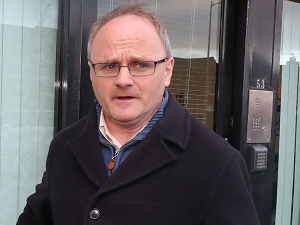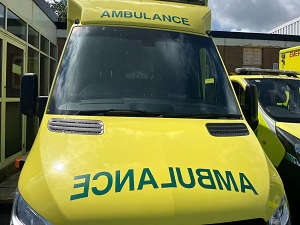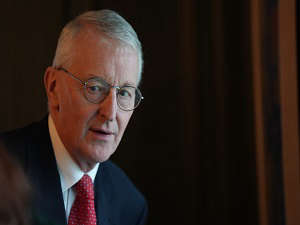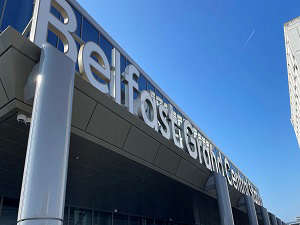
By Q Radio News
A former MP who resigned after angering relatives of 10 Protestants shot dead in a sectarian massacre has won a council seat in the Northern Ireland local elections.
Barry McElduff was forced to resign his Westminster seat last year amid an outcry after he posted a video of himself balancing a loaf of Kingsmill bread on his head.
It was posted on his Twitter account on the anniversary of the Kingsmill atrocity, which saw 10 workmen shot dead by republicans in Co Armagh on January 5, 1976.
The Co Tyrone man was elected to Fermanagh and Omagh District Council on the fourth count.
Mr McElduff and his supporters did not celebrate when it was officially confirmed.
DUP leader Arlene Foster said she does not believe Mr McElduff has recognised the hurt and pain he caused to victims in Northern Ireland.
Meanwhile, the son of murdered Belfast solicitor Pat Finucane was elected to Belfast City Council.
John Finucane was elected on the first count of the Castle DEA - which encompasses parts of north Belfast - with 1,650 votes, just behind the Alliance Party's Nuala McAllister, who attracted 1,787 votes.
He previously ran for office in the 2017 Westminster election in North Belfast and won 19,159 votes, finishing second behind DUP deputy leader Nigel Dodds.
Pat Finucane was shot dead by loyalists at the age of 39 in front of his wife and three children in 1989.
The Ulster Unionist Party has suffered a number of high profile causalities, including Jeffrey Dudgeon who lost his council seat in the Balmoral DEA of Belfast.
In what has been a disastrous election for his party in Belfast, Mr Dudgeon was eliminated on the third stage of the count.
In 1981, Mr Dudgeon took a legal challenge to Europe to change the law on homosexuality in Northern Ireland.
The court ruled in his favour and the law in Northern Ireland was changed, bringing the region into line with the rest of the UK.
In further controversy, Mrs Foster said she will consider comments made by former health minister Jim Wells about the DUP's first openly gay councillor in Northern Ireland.
The leader said her party will look at a number of issues including "bad behaviour" by members after the Northern Ireland local elections have concluded.
It comes after Mr Wells said his former leader, the Rev Ian Paisley, would be "aghast" at the decision to run gay DUP candidate Alison Bennington.
The DUP's founder once led a campaign to, in his words, "Save Ulster from Sodomy" and prevent the decriminalisation of homosexuality.
Mrs Foster said Mr Wells should not have made those comments to the media.
"(Jim) should have been coming through the normal routes, through the party, if he had concerns about those issues," she said.
"We will look at all of those issues after the election. We will be looking at vote management schemes, we will be looking at where we did very well and we will be looking at bad behaviour as well."
Independent republican councillor Gary Donnelly topped the poll in a Moor DEA of Derry City and Strabane District Council.
He is considered to be one of the public faces of dissident republicanism in Northern Ireland.
Mr Donnelly's election comes just weeks after dissident republicans murdered journalist Lyra McKee during disturbances in Londonderry.
It sparked outrage across the world as well as a swell of criticism for dissident republican terrorism in Northern Ireland.
Mr Donnelly topped the poll in The Moor DEA with 1,374 first-preference votes, just over the quota of 1,292 votes.
Counting continues across Northern Ireland following the local government elections.
The first day of the count saw gains for the DUP and the centralist Alliance Party, while the Ulster Unionists suffered some losses.
DUP deputy leader Nigel Dodds said his party had had a very good day.
"I am delighted with some of our results west of the Bann, we are taking extra new seats in places where we haven't done before, and pleased that a lot of our sitting councillors have been returned, but we have also got some very good fresh blood coming through," he said.
The contest was dominated by early gains in the greater Belfast area for the Alliance Party and Green Party, solid performances from Sinn Fein and the DUP and a slump in support for the Ulster Unionists.
Of the smaller parties, the Progressive Unionists suffered a blow in Belfast with the loss of Julie-Anne Corr-Johnston - while People Before Profit gained a seat with Fiona Ferguson.
The son of a prison officer shot dead by dissident republicans in 2012 was also elected for the DUP.
Kyle Black's father David died following a motorway drive-by shooting.
In Ards and North Down Council, Tom Smith, deselected as a DUP councillor after he voted to light up a council building in rainbow colours, retained his seat as an independent.
In Londonderry in the far west, the nationalist SDLP's Mary Durkan was elected. The barrister is the sister of Stormont Assembly member Mark H Durkan.
The north-west city also saw Anne McCloskey become the first candidate from the anti-abortion all-Ireland Aontu party to be elected.
In Belfast, Ulster Unionist councillor Sonia Copeland dedicated her victory to community worker Ian Ogle, who was stabbed to death on a street in East Belfast in January.
In Antrim and Newtownabbey, a former DUP mayor was returned with an increased vote following his recent conviction for drink-driving.
Thomas Hogg served a five-month suspension from the council earlier this year.
He is one of two councillors to be re-elected after a drink-driving conviction.
Alliance councillor Patrick Brown topped the poll at the Rowallane district electoral area in the Newry, Mourne and Down council.
He was caught riding his motorbike while under the influence of alcohol in 2017.
The council election is being conducted by single transferable vote, a proportional representation system.
A fresh bid to restore Stormont's moribund powersharing institutions is to begin next week.
The last Democratic Unionist/Sinn Fein-led coalition imploded amid a row about a botched renewable energy scheme.
The rift between the erstwhile partners-in-government subsequently widened to take in disputes over the Irish language, same-sex marriage and the legacy of the Troubles.
A total of 819 candidates are standing for 462 available seats across 11 council areas in Northern Ireland.


 Shock over record number of attacks on ambulance crew
Shock over record number of attacks on ambulance crew
 Police investigate petrol bomb attack at Co Antrim flat
Police investigate petrol bomb attack at Co Antrim flat
 Benn to discuss legacy issues with Harris at Hillsborough Castle
Benn to discuss legacy issues with Harris at Hillsborough Castle
 Legal papers lodged in challenge to Irish language signs at Belfast station
Legal papers lodged in challenge to Irish language signs at Belfast station